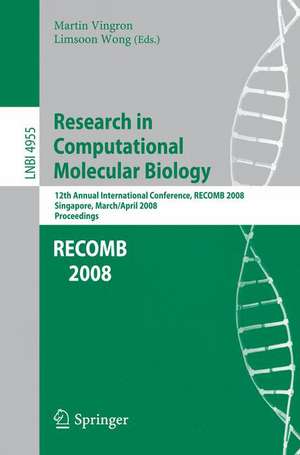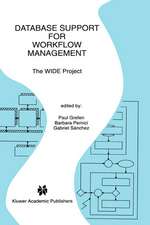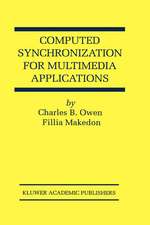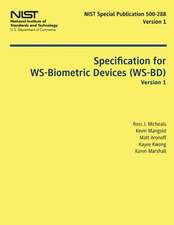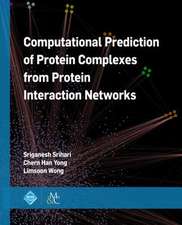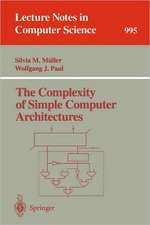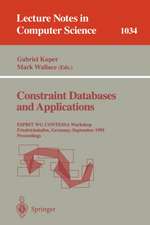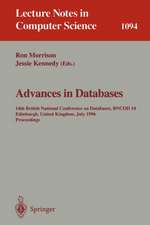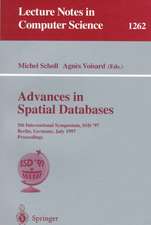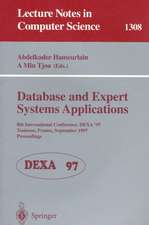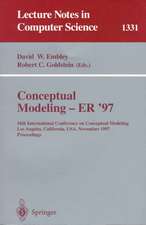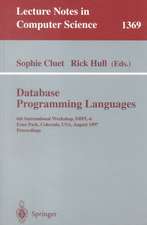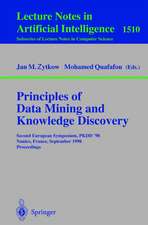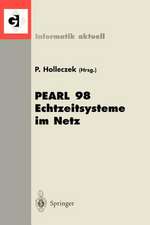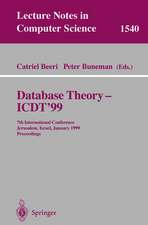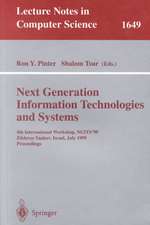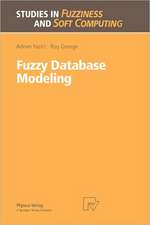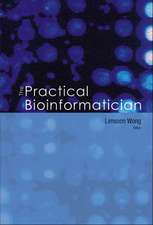Research in Computational Molecular Biology: 12th Annual International Conference, RECOMB 2008, Singapore, March 30 - April 2, 2008, Proceedings: Lecture Notes in Computer Science, cartea 4955
Editat de Martin Vingron, Limsoon Wongen Limba Engleză Paperback – 14 mar 2008
Din seria Lecture Notes in Computer Science
- 20%
 Preț: 1061.55 lei
Preț: 1061.55 lei - 20%
 Preț: 307.71 lei
Preț: 307.71 lei - 20%
 Preț: 438.69 lei
Preț: 438.69 lei - 20%
 Preț: 579.30 lei
Preț: 579.30 lei -
 Preț: 410.88 lei
Preț: 410.88 lei - 17%
 Preț: 427.22 lei
Preț: 427.22 lei - 20%
 Preț: 596.46 lei
Preț: 596.46 lei - 15%
 Preț: 448.04 lei
Preț: 448.04 lei - 20%
 Preț: 353.50 lei
Preț: 353.50 lei -
 Preț: 389.49 lei
Preț: 389.49 lei - 20%
 Preț: 309.90 lei
Preț: 309.90 lei - 20%
 Preț: 645.28 lei
Preț: 645.28 lei - 20%
 Preț: 763.23 lei
Preț: 763.23 lei - 15%
 Preț: 580.46 lei
Preț: 580.46 lei - 20%
 Preț: 310.28 lei
Preț: 310.28 lei - 20%
 Preț: 655.02 lei
Preț: 655.02 lei - 20%
 Preț: 1183.14 lei
Preț: 1183.14 lei - 20%
 Preț: 340.32 lei
Preț: 340.32 lei -
 Preț: 449.57 lei
Preț: 449.57 lei - 20%
 Preț: 591.51 lei
Preț: 591.51 lei - 18%
 Preț: 938.83 lei
Preț: 938.83 lei - 20%
 Preț: 337.00 lei
Preț: 337.00 lei - 20%
 Preț: 649.50 lei
Preț: 649.50 lei - 20%
 Preț: 607.40 lei
Preț: 607.40 lei - 20%
 Preț: 1414.79 lei
Preț: 1414.79 lei - 20%
 Preț: 1024.44 lei
Preț: 1024.44 lei - 20%
 Preț: 583.40 lei
Preț: 583.40 lei - 20%
 Preț: 453.32 lei
Preț: 453.32 lei - 20%
 Preț: 575.49 lei
Preț: 575.49 lei - 20%
 Preț: 1075.26 lei
Preț: 1075.26 lei - 20%
 Preț: 585.88 lei
Preț: 585.88 lei - 20%
 Preț: 825.93 lei
Preț: 825.93 lei - 17%
 Preț: 360.20 lei
Preț: 360.20 lei - 20%
 Preț: 763.23 lei
Preț: 763.23 lei - 20%
 Preț: 340.32 lei
Preț: 340.32 lei - 20%
 Preț: 504.58 lei
Preț: 504.58 lei - 20%
 Preț: 369.13 lei
Preț: 369.13 lei - 20%
 Preț: 580.93 lei
Preț: 580.93 lei - 20%
 Preț: 343.62 lei
Preț: 343.62 lei - 20%
 Preț: 350.21 lei
Preț: 350.21 lei - 20%
 Preț: 583.40 lei
Preț: 583.40 lei - 20%
 Preț: 583.40 lei
Preț: 583.40 lei - 15%
 Preț: 438.59 lei
Preț: 438.59 lei - 20%
 Preț: 341.95 lei
Preț: 341.95 lei - 20%
 Preț: 238.01 lei
Preț: 238.01 lei - 20%
 Preț: 538.30 lei
Preț: 538.30 lei
Preț: 342.78 lei
Preț vechi: 428.48 lei
-20% Nou
Puncte Express: 514
Preț estimativ în valută:
65.59€ • 70.14$ • 54.69£
65.59€ • 70.14$ • 54.69£
Carte tipărită la comandă
Livrare economică 17 aprilie-01 mai
Preluare comenzi: 021 569.72.76
Specificații
ISBN-13: 9783540788386
ISBN-10: 3540788387
Pagini: 480
Ilustrații: XVI, 480 p.
Dimensiuni: 155 x 235 x 19 mm
Greutate: 0.7 kg
Ediția:2008
Editura: Springer Berlin, Heidelberg
Colecția Springer
Seriile Lecture Notes in Computer Science, Lecture Notes in Bioinformatics
Locul publicării:Berlin, Heidelberg, Germany
ISBN-10: 3540788387
Pagini: 480
Ilustrații: XVI, 480 p.
Dimensiuni: 155 x 235 x 19 mm
Greutate: 0.7 kg
Ediția:2008
Editura: Springer Berlin, Heidelberg
Colecția Springer
Seriile Lecture Notes in Computer Science, Lecture Notes in Bioinformatics
Locul publicării:Berlin, Heidelberg, Germany
Public țintă
ResearchCuprins
Computational Biology: Its Challenges Past, Present, and Future.- Bootstrapping the Interactome: Unsupervised Identification of Protein Complexes in Yeast.- CompostBin: A DNA Composition-Based Algorithm for Binning Environmental Shotgun Reads.- Reconstructing the Evolutionary History of Complex Human Gene Clusters.- Ab Initio Whole Genome Shotgun Assembly with Mated Short Reads.- Orchestration of DNA Methylation.- BayCis: A Bayesian Hierarchical HMM for Cis-Regulatory Module Decoding in Metazoan Genomes.- A Combined Expression-Interaction Model for Inferring the Temporal Activity of Transcription Factors.- A Fast, Alignment-Free, Conservation-Based Method for Transcription Factor Binding Site Discovery.- The Statistical Power of Phylogenetic Motif Models.- Transcriptional Regulation and Cancer Genomics.- Automatic Recognition of Cells (ARC) for 3D Images of C. elegans.- Spectrum Fusion: Using Multiple Mass Spectra for De Novo Peptide Sequencing.- A Fragmentation Event Model for Peptide Identification by Mass Spectrometry.- A Bayesian Approach to Protein Inference Problem in Shotgun Proteomics.- De Novo Sequencing of Nonribosomal Peptides.- Systems Metabolic Engineering.- Protein Function Prediction Based on Patterns in Biological Networks.- Automatic Parameter Learning for Multiple Network Alignment.- An Integrative Network Approach to Map the Transcriptome to the Phenome.- Fast and Accurate Alignment of Multiple Protein Networks.- High-Resolution Modeling of Cellular Signaling Networks.- At the Origin of Life: How Did Folded Proteins Evolve?.- Locating Multiple Gene Duplications through Reconciled Trees.- Rapid and Accurate Protein Side Chain Prediction with Local Backbone Information.- Algorithms for Joint Optimization of Stability and Diversity in Planning Combinatorial Libraries of Chimeric Proteins.- DLIGHT – Lateral Gene Transfer Detection Using Pairwise Evolutionary Distances in a Statistical Framework.- Computation of Median Gene Clusters.- BCL-2: From Translocation to Therapy.- Detecting Disease-Specific Dysregulated Pathways Via Analysis of Clinical Expression Profiles.- Constructing Treatment Portfolios Using Affinity Propagation.- Bubbles: Alternative Splicing Events of Arbitrary Dimension in Splicing Graphs.- More Efficient Algorithms for Closest String and Substring Problems.- Disruption of a Transcriptional Regulatory Pathway Contributes to Phenotypes in Carriers of Ataxia Telangiectasia.- Accounting for Non-genetic Factors Improves the Power of eQTL Studies.- Effects of Genetic Divergence in Identifying Ancestral Origin Using HAPAA.- On the Inference of Ancestries in Admixed Populations.- Increasing Power in Association Studies by Using Linkage Disequilibrium Structure and Molecular Function as Prior Information.- Panel Construction for Mapping in Admixed Populations Via Expected Mutual Information.- Constructing Level-2 Phylogenetic Networks from Triplets.- Accurate Computation of Likelihoods in the Coalescent with Recombination Via Parsimony.
